One would expect most — or at least the majority — in a society to value being accountable to one’s words and action and/or holding others accountable to them. What kind of a society or country would one filled mostly by people who, in the way they talk and act, reveal the fact that they don’t believe that they are accountable to anyone (and therefore won’t admit to, forget apologize for, any mistakes etc.) and/or who, also in the way they talk and act, directly or indirectly, expose the fact that they aren’t interested in holding others accountable? A highly dysfunctional, hollow, and deeply flawed one. And that’s what I have come to conclude Nepal is, unfortunately.
In the last blog post Why Compassion and Empathy Is In Such Short Supply In Nepal, In Buddha’s Country, I identified the low power of imagination of Nepalis as being responsible for that. One of the reasons for the low power of imagination among Nepalis is the low level of education of the population, low level of poor quality formal as well as informal education — one that teaches students to memorize facts and figures and regurgitate them in examinations, and to follow archaic traditional beliefs and practices derived mostly from religion.
Not even a quarter of the adult population in Nepal have twelve or more years of that poor quality education. In fact, the quality of education is so poor, in spite of the country ranking in the bottom 25% in education system (149 out of 177), a vast majority in the country believe it’s “Good” or “Very Good” (see below).
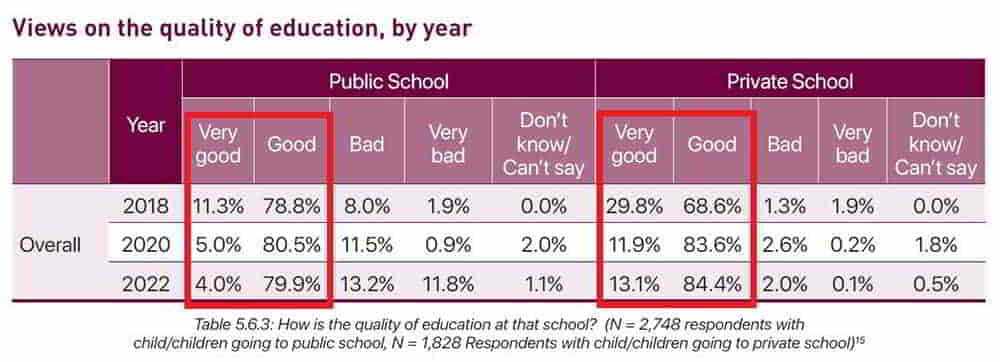
Not surprisingly, the population is not even 100% literate.
Lack of imagination and therefore the inability to empathize is but just one of a number of outcomes of that.
Another seriously disastrous outcome of low level of poor quality education is the population’s general inability to reason logically, or to think straight, or to demonstrate just some clarity of thought on very general but minor issues and/or topics, forget on some crucial and overarching and complex issues and topics (such as those around structures and systems in the country, for example).
The following reproduction of a Facebook post in Nepali, which I came across on twitter in 2022, neatly summarizes a couple of the major issues with the way Nepalis argue or debate and therefore think. One reason I love it is the fact that it starts off sarcastically with the statement, “It’s near impossible to estimate how clever Nepalis are.”
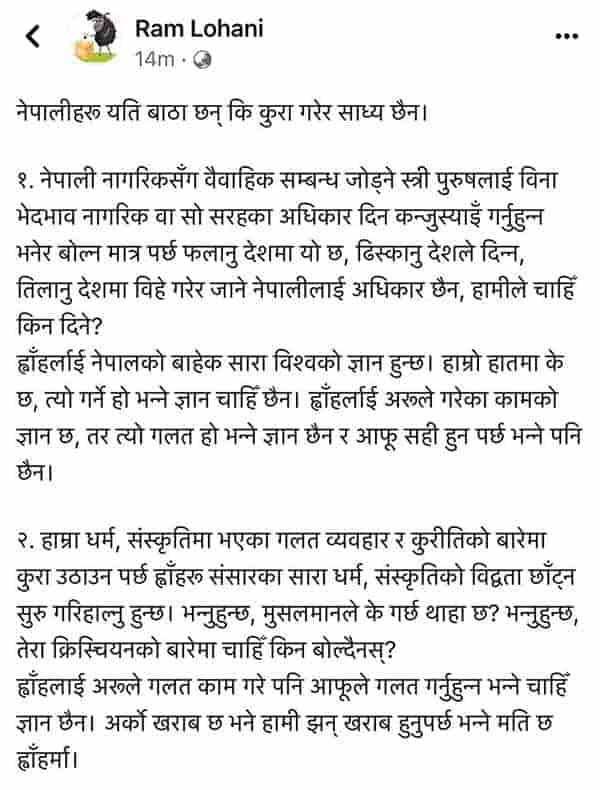
The answer to the first rhetorical question he asks goes, “Apart from Nepal, they [Nepalis] are knowledgeable about the rest of world. But, were we to attempt an analysis of what we Nepalis have on our own hands, they are at a loss. They are aware of what others do but they aren’t aware of them being wrong nor are they aware that they themselves should be — or do what is — right.”
The answer to the second rhetorical question he asks goes, “They [Nepalis] are not aware of the fact that they should not do what’s wrong even if others are doing it. Our mentality, instead, is that if others are cheats, then we should be bigger cheats.” That is, Nepalis follow the flawed logic that two wrongs make a right, something even a friend with advanced degrees argued.
Sadly, I have come across examples of the above both in real life and on social media again and again in the last decade I have lived and worked in the country.
Here’s is an example from an exchange in 2017. In this one, a Nepali gave a pass to casual sexism — by saying how that’s something “fun”! (Click here to go to the twitter thread where all these screenshots came from.)

In my response, I pointed out the problem with that attitude of his.

In response, the user wanted me to see the “creative” side of it. I ended it with, “I rest my case.”

To a casual reader, to especially an average Nepali, what the user did might actually seem pretty innocuous. But, not really. That standard but flawed practice of Nepalis giving a pass to — and indirectly or inadvertently justifying — that which they shouldn’t, firstly, reveals how Nepalis are unaware of how and why doing that is wrong, and, secondly, how detrimental that has been to Nepali society.
Explaining away something wrong (in this case, casual sexism) in that manner as a matter of course, lets people directly or indirectly responsible for that, or those supporting them, off the hook — they don’t have to be accountable. Worse still, inadvertently, when you do that as a matter of course, you are revealing how you yourself will not hold those responsible accountable (to what they say and/or do).
And, as you may have guessed, when it comes to making such “arguments” or “reasoning” that way as a Nepali, and NOT understanding or recognizing the problem with that, Iamotuppi is NOT an exception.
(In fact, coming across people with such nonchalant attitude towards casual sexism who failed to understand the problem with it again and again, I ended up producing this blog post on the subject.)
Here’s another example (from 2020) where, again, a Nepali indirectly and inadvertently argues the issue the user (Samriddhi Rai) points out –about young females being paired with much older males in movies — should be given a pass by drawing attention to the fact that it also happens in “Hollywood” (see bottom of image below).
So, I responded with an analogy to expose that (see top of image below). (Click here to go to the twitter thread where all these screenshots came from.)

Except, he justified that statement of his by saying, “Or maybe I was just pointing out the facts” (see bottom of image below), to which I responded with another fact and tried to get him to recognize the problem (see top of image below).

I followed that up with with a reiteration of the analogy.

BUT apparently, according to him, I am the one refusing to wake up (see bottom of image below)! See top of the image for my response.
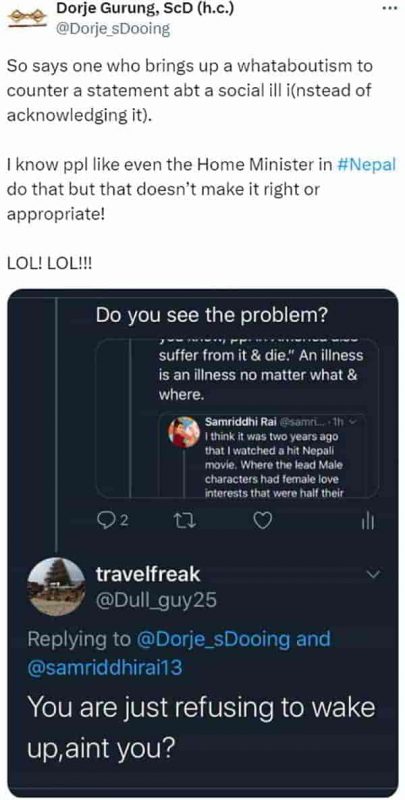
Not surprisingly, not unlike many who make or share such casual statements, the user had no idea what was wrong with it.
The screenshot below is also addressed to the same user but the source is actually this.

Here’s yet another one, also from 2020. Here the user AnantaAdhikar18 tries to give a pass to issues I point out about Hinduism (see top of image below) by saying how it’s the same in other religions such as Islam and Christianity (bottom of image below).

In response, I pointed out how what he has responded with is a Whataboutery.

And in another response, I shared the conclusion that follow from his Whataboutery.

The user had no response. (Click here to view the exchange on Twitter.)
In the following exchange from May 2023, the user tries to give a pass to people showing public support for a convicted rapist and national cricket player Sandeep Lamichhane by taking out a rally saying that “celebrity worship is not unique to Nepal” (see highlighted bit in the bottom of the second image below).

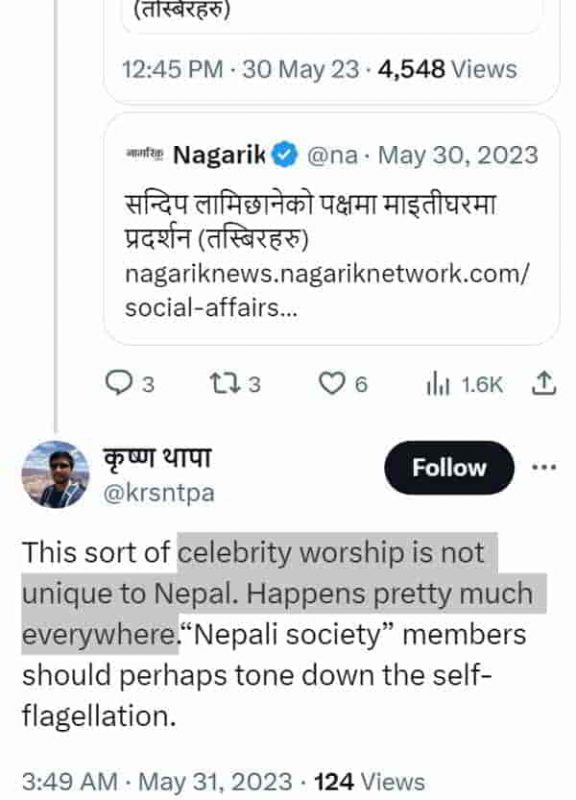
Reproduced below is but just ONE of my responses. In it, I pointed out the problem.
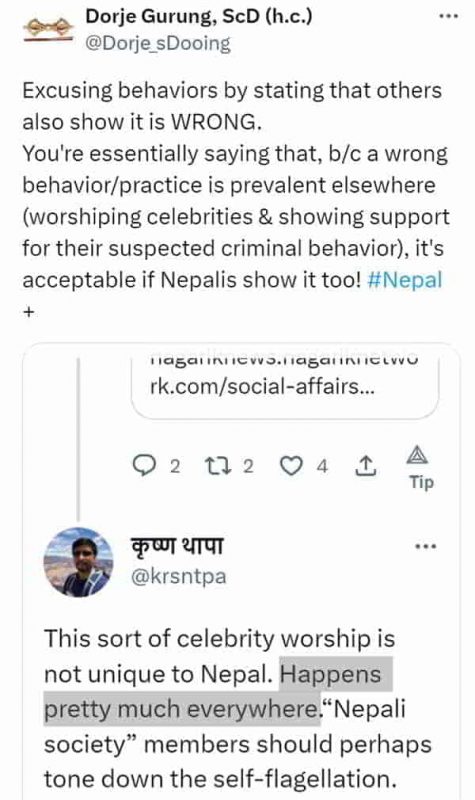
Click here to view the exchange on twitter.
And finally, these exchanges are from Sept. 2023.
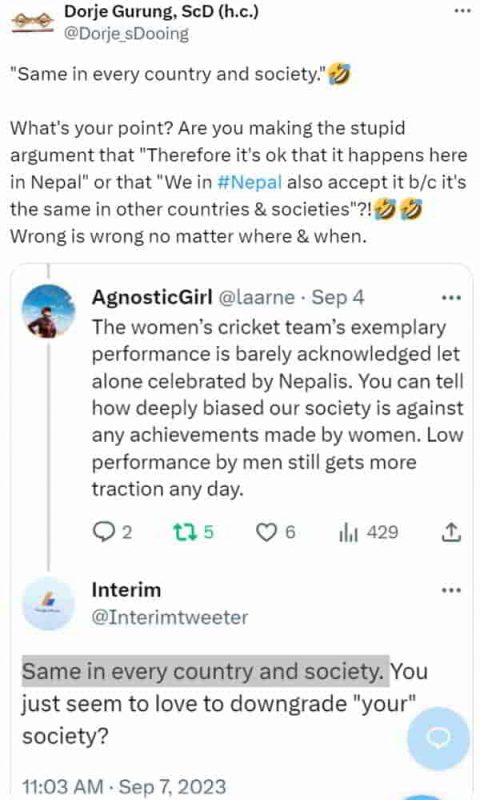
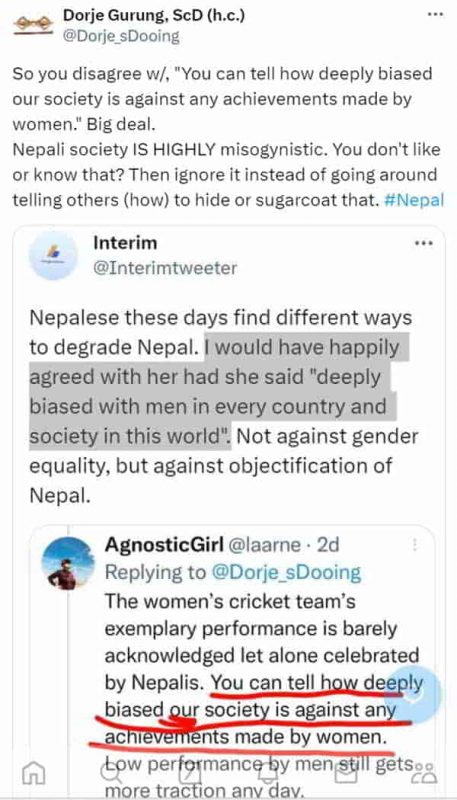
Here’s the final one from twitter, one also from 2023. In this one the user, after some gibberish, says, “If you [an LGBTQ+] want to be treated equal, try to blend in with normal life not be flashing around rainbows”, and gives a pass to homophobes by declaring, “it’s ok to be a homophobe” (see the highlighted bit towards the bottom).

All that and more are results of, again, the poor level of poor quality education in the country. The poor quality of education in Nepal, firstly, does NOT impart the ability to reason logically, and, secondly, they are unable to recognize or understand how statements that casually give a pass to or justify or explain away, directly or indirectly, wrong or unjust beliefs, words, practices, deeds etc. makes a mockery of the idea of accountability. Both have contributed to the dysfunctional, hollow, and deeply flawed society that Nepal is. What everyone should be doing instead is the exact opposite — calling or labeling a wrong someone or some institution or some body has said or done “wrong” and, thereby, attempt at making or holding them accountable.
I am pretty certain that the list of beliefs, attitudes, behaviors, practices, actions etc. that Nepalis have a tendency to give a pass to by default is a massive one. Here’s my own compilation, listed by categories, including ones that may have already appeared or may have already been hinted at so far.
Things that Nepalis justify by declaring “It/That is our tradition/culture” and/or “That’s how we’ve always done it.”
- following time consuming social FORMS & PROTOCOLS
- NOT employing best practice or best practices in a field that are normal practices in advanced societies
- endorsing or holding on to detrimental religious beliefs and practices (such those that are sexist, casteist, and those that infringe on rights of others, such as child marriage, females not being able to pass on her citizenship)
- TREATING/VIEWING fellow Nepalis a certain way based on their appearance/facial features and/or names and/or surnames and/or their accent, which reveal their ethnicity and caste
- VALUING/DEVALUING lives of people based on their age, gender, sexuality, caste, class (life of one below their own “social standing” (“taha” in Nepali) is for example valued less)
- corporal punishment of children both in school and at home
Things that Nepalis justify by declaring “That’s all we are taught and that’s all we know.”
- MISGUIDED BELIEFS (about people of different abilities, genders, castes, and nationalities, or about people following a religion other than Hinduism, for example)
- MIGUIDED PRACTICES (about treating people differently based on their age, gender, caste, nationality, sexuality, for example)
- people BEING a certain way (for example, racist, sexist, ageist, casteist, homophobic etc. etc.)
Another wording of the above justifying or explaining WHY Nepalis are the way they are: “We are a product of our society.” That is, they blame it on the society. They find fault with the society and its education system, both formal and informal and wash their own hands off — or those of fellow Nepalis — of their behaviors, and thereby ignore their own agency and/or responsibilities.
(What’s worse about the article using that as one of the many arguments to excuse behaviors of those in influential positions is that it labels the actions of Nepalis, NOW in the twenty-first century, holding them accountable and making them face the consequences of their words and actions, just here and there from time to time, as “cancel culture”! Sadly!)
Yes, on the one hand, using that excuse is yet again another DEMONSTRATION of how the education system has failed them. The system did NOT teach them to question, reflect on, analyze, and evaluate their attitudes, beliefs, behaviors, decisions, actions, nor to learn from their mistakes and experiences and to grow. Sure the system may have taught them to recognize the society’s role in why they are the way they are BUT it does not seem to have taught them to think for themselves, nor to take responsibility for their own words and/or actions, nor to learn that a society is what it is ALSO because of who, what, and how they are in their everyday lives.
So, on the other hand, as an adult, its incumbent upon yourself to educate yourself on things that the society and education system did not teach you and, further, to unlearn many of the things that your society did teach you but were wrong.
Moving on to the next list…these are things that Nepalis justify by declaring “They do it in other countries too” or “Other people/religions do it too” etc.
- NOT employing best practice or best practices in a field that are normal practices in advanced societies (such as in education, in health care, in the entertainment industry etc.)
- employing WORST PRACTICES (such as in education, in entertainment industry, in social and religious rituals and ceremonies etc.)
- people BEING a certain way (for example, racist, sexist, ageist, casteist, homophobic etc. etc.)
- endorsing or holding on to detrimental religious beliefs and practices, such those that are sexist, casteist, homophobic, etc. and even those that infringe on rights of others, and requiring others to respect that
Things that Nepalis justify by finding some “fault” in the person doing it or saying etc.
- old people BEING a certain way (for example, sexist, ageist, casteist, law breakers etc.) by saying they are too old and can’t change
- shooting down opinions or ideas of fellow Nepali by declaring them “dollar-farmers”/”fundits” (i.e. funded by an international organization) (i.e. attacking the messenger instead of the message, as it were)
Two others that could NOT be put under any of the above categories.
- justifying NOT USING or NOT RELYING on — or even the wholesale REJECTING — data about or related to the country and people etc. by stating, “They come with inherent errors” or “They can be manipulated” or “Averages are misleading or aren’t accurate” or “INGOs with an agenda are behind them” etc. etc.
- justifying suffering of victims of events or processes or even due to actions of people by finding fault with the victim (i.e. by blaming the victim)
As bad as all that is, unfortunately, it’s also pretty routine for Nepalis to defend a fellow Nepali’s opinion or argument by saying, “Aa-aafno bichar ho” (“Its one’s own opinion”/”Everyone is entitled to their own opinion”). Of course, it’s ok to have an opinion on any or even all kinds of topics and issues. BUT one should NOT have a logically flawed opinion or argument, or one that is inconsistent with — or contradicts — established knowledge and understanding, or one that is counter to what studies and research have already established etc. The last one, incidentally, is disinformation!
Furthermore, defending or showing support for such opinions and/or argument is wrong because that essentially says that no one has to be accountable to what they say and do. Given so many in Nepal are guilty of doing that, Nepali society tells its new members, “It’s ok to say and do whatever you want, it’s ok to NOT be accountable or NOT seek accountability or NOT expect accountability or NOT hold anyone accountable.” That, again, is one of the many reasons behind the society being a hollow and deeply flawed.
But, sadly, there are those who are unaware of all that partly because Nepal’s education system does NOT teach students about philosophy and logic. Not surprisingly, there are those who are not even aware that there are such things called rules of logic (see below). The user says, “Dorje_sDooing sir, labeling other illogical does NOT make you logical” (bit inside the red rectangle at the top of the image below). Yes, in my response to her, I had to point out that there are such things called rules of logic.

Unfortunately, the above is NOT an exceptional objection. The sense I have gotten about Nepalis’ beliefs in general around opinions and their perception of logic — based on my conversations on all sorts of different topics with all sorts of Nepalis both in real life in many different contexts and on social media for the past eleven years — is that not only do most Nepalis seem to believe that every one is entitled to their own opinion, they are also entitled to their own logic!
If all that was not depressing enough, there is THE blanket statement, which is used or uttered by pretty much everyone in order to give a pass to anything and everything. That statement is no other than, “Ke garne?! Nepal yesai ho.” (What to do?! Such/This is Nepal). What it actually means or implies might be slightly different based on the caste/class of the person uttering it. That, I am pretty sure, is also the explanation behind those who lament people doing that which is wrong but turn right around and give themselves the pass for they themselves doing the same thing. I can imagine them thinking, “Ke garne?! Hami Nepali yestai ho.” (What to do?! Such are us Nepalis.)
Here, in conclusion, is the upshot.
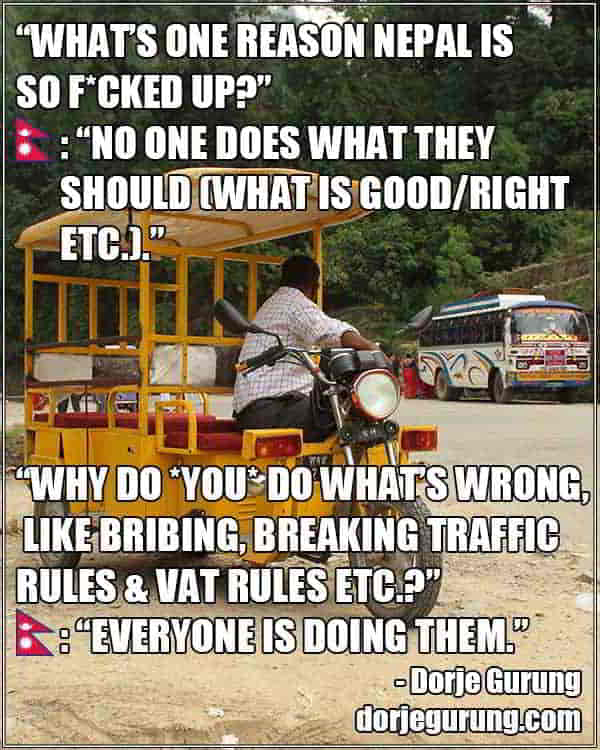
What’s the solution? Quality education that teaches the masses HOW to think, of course! But those in positions of social, economic, and political power in Nepal, the ruling caste, will continue to keep the level of education of the population low and the quality of education poor — so poor that the population don’t even know it’s poor — the way they have always done throughout the entire modern history of the country. After all, they know that they won’t be able to control and manipulate for power (and money) a population that’s able to reason and think for themselves.
What do you think?
